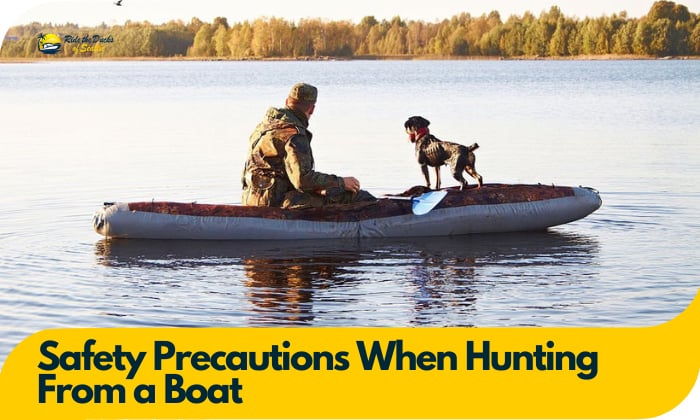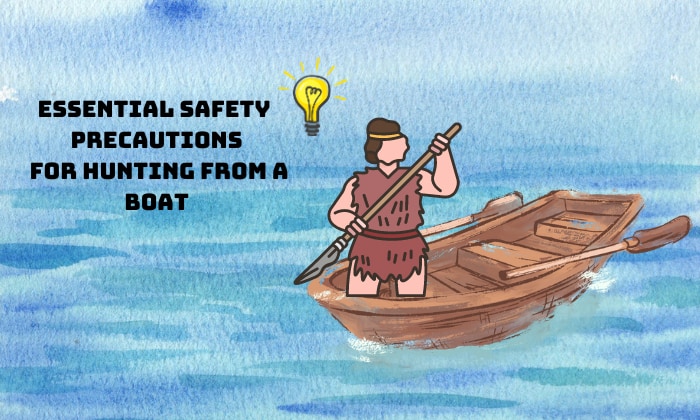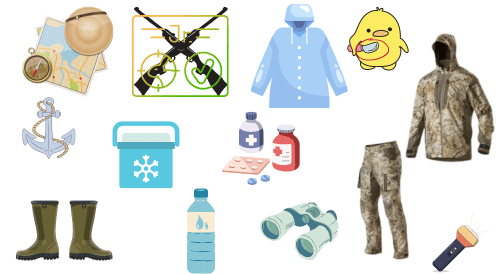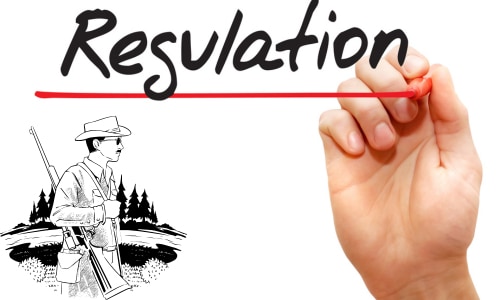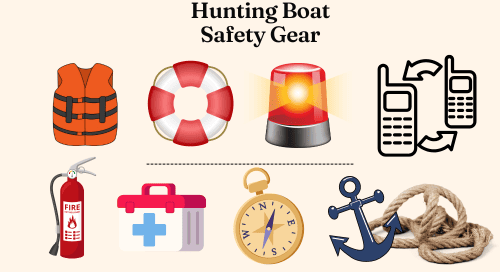As hunting aficionados, there’s no denying the appeal of setting sail on a boat into the vast expanses of water and embracing the thrill of hunting from a floating vessel. Yet, the thrill and experience of hunting from a boat also come with risks that demand all attention and preparation.
If one is an experienced hunter or a novice eager to explore this unique approach, understanding and implementing safety precautions when hunting from a boat is essential to guarantee a successful and incident-free expedition.
Table of Contents
Essential Safety Precautions for Hunting from a Boat
What safety precaution should you take when hunting from a boat? While this activity presents a thrilling chance to explore and access remote hunting grounds, it’s important to prioritize safety and follow recommended safety precautions below:
- If possible, hunting with a partner is advisable. It increases safety by assisting in case of emergencies. It’s also advisable that the two of you should be sitting back-to-back to avoid accidental and double recoil, which can destabilize the boat.
- Before any hunting trip, inspect the boat to ensure it is in good working condition. Check for leaks, engine malfunctions, and other mechanical issues.
- Keep a close eye on weather forecasts and be aware of any changes in weather patterns. Always prioritize safety over the hunt.
- Ensure everybody wears a properly-fitting USCG-approved life jacket or Personal Flotation Device (PFD in case someone falls overboard.
- One should be familiar with the waterways, potential hazards, and navigational aids in the hunting zone. Using updated charts and GPS systems to guide safely is crucial.
- Avoid overloading the boat beyond its recommended capacity. Distribute the weight evenly to maintain stability and prevent capsizing.
- Ensure that firearms are unloaded and securely stored when not in use. One foolproof idea is treating the gun as if it is loaded to ensure maximum carefulness and safety of everyone on board.If you insist on loading the gun, make sure that its safety catch is on to prevent accidental shooting.
- Always have a reliable communication device, such as a marine radio or cell phone, to contact emergency services if needed.
- If using a hunting stand or blind on your boat, ensure it is stable, secure, and anchored to avoid excessive movement that could destabilize and overturn the hunting vessel.
- Familiarize oneself with local hunting and boating regulations, like bag limits, hunting seasons, and restricted areas.
- Inform your close ones about your hunting trip and the locations you plan to go to.
- If you don’t know how to swim, learn how to do so before participating in the hunting trip.
Boat Hunting Checklist
When venturing out for a hunting expedition on a boat, it’s crucial to be well-prepared and organized for a safe and successful outing. This section about hunting from a boat safety tips is a general guide for what you need to prepare for the trip.
- Inspect the boat for any leaks or mechanical issues.
- Check the fuel and ensure that it is enough for the trip.
- Test the engine to see if it is running smoothly.
- Check the boat’s lights and ensure they are working.
- Verify that all safety equipment is on board and in good condition.
For Navigation and Safety
- GPS systems to navigate the waters
- Anchor and appropriate rope or chain for secure mooring
- Extra ropes or lines for tying off the boat
Hunting Gear
- Firearms (ensure compliance with local laws and regulations)
- Ammunition is stored securely in a locked container
- Proper firearm storage
- Hunting license, permits, and any required documentation
- Hunting accessories
- Game coolers for storing harvested animals
Personal Gear
- Appropriate hunting clothing
- Extra clothing in case you need to change
- Waterproof and insulated boots
- Rain gear or extra layers of clothing
- Hat, gloves, and face mask
- Insect repellent and sunscreen
- Food and water provisions for the duration of the trip
- Knife or multi-tool for field dressing and general use
- Flashlight or headlamp with extra batteries
Miscellaneous
- Trash bags for proper waste disposal
- Towels for cleaning and maintenance
- Binoculars for scouting or wildlife observation
- Field guide or reference materials for identifying game species
- Extra cash or payment options for unexpected expenses
Boat Hunting Regulations
Before anything else, everybody must be familiar with the applicable hunting and boating laws to ensure compliance and promote responsible hunting approaches. Here are some factors to consider.
- Different jurisdictions may have specific requirements for hunting from a boat, such as separate small hunting boats permits or stamps.
- Understand and respect the boundaries of areas where hunting from a boat is prohibited. Often, this will include protected wildlife areas, national parks, private property, or designated safety zones.
- Comply with regulations about firearms. This may include restrictions on specific firearm types, caliber sizes, etc. Ensure that the equipment adheres to safety and legal requirements.
- Many jurisdictions have requirements for hunting from a boat, which may include the required use of life jackets, PFDs, proper firearm storage, etc.
- Understanding the reporting and tagging requirements for the harvested game for these requirements helps wildlife management and population monitoring efforts of the locality.
- Respecting the environment and practicing ethical hunting principles are vital. This includes avoiding excessive disturbance to wildlife and destruction of the game and adhering to ethical shot placement and harvesting techniques. It will also involve following guidelines for the proper disposal of waste and carcasses.
Hunting Boat Safety Gear
Safety gear on board is crucial for ensuring the well-being of anyone looking to hunt from a boat. These are some of what’s needed.
- An adequate number of PFDs or life jackets for everyone on board and confirming these are U.S. Coast Guard-approved, properly fitted, and in good condition can prove useful.
- At least one throwable flotation device, like a ring buoy or floating cushion, readily accessible on the boat can be used to assist someone who has fallen overboard or is in distress in the water.
- Ensure the boat has functional navigation lights, including red and green sidelights and white lights, which can help, especially during low visibility or nighttime hunting.
- Keep a safety whistle or horn on board as an additional sound signaling device.
- Communication devices to contact emergency services or other waterfowl hunting boats are a necessity. This can be as simple as a cell phone with waterproof protection or a satellite phone.
- Carrying a marine-grade fire extinguisher on board is essential for easy access in a fire emergency.
- Have a well-stocked first aid kit with basic medical supplies, bandages, antiseptics, and even personal medications.
- Navigational aids such as charts, GPS systems, and compasses help anyone navigate the waterways safely and accurately.
- To securely moor the boat, carry an appropriate anchor and enough rope or chain. This will also ensure stability during hunting skiffs activities and can be vital in case of engine failure or when waiting out adverse weather conditions.
FAQs
What should you do before firing a shot?
Always identify the target and ensure it is a legal game before preparing to take a shot. One should use binoculars or other optical aids to closely observe the animal and confirm its species, size, and gender.
It is also a required precaution to look at the surroundings to ensure there are no individuals that could be endangered by the shot. One more thing is one needs to be seated before firing a shot.
How should firearms be transported on a boat?
Firearms should always be unloaded during transport on a boat, and storing the ammunition and firearm separately is necessary. Aside from that, familiarizing oneself with local laws and regulations governing the transportation of firearms on a boat is essential since different jurisdictions may have specific requirements.
The best way to maintain stability while hunting on a boat?
Make sure that weight is evenly distributed on the boat to maintain stability. Having too much weight concentrated on one side should be avoided, as this can lead to imbalance and potential capsizing.
Plus, minimizing unnecessary movement on the boat, especially when taking shots, is a surefire way to avoid instability.
If hunting with a partner, the two of you should be sitting back-to-back, with one on the stern and one on the bow.
Conclusion
Adhering to these safe boat hunting practices to prevent accidents and promote a safe hunting environment is integral for safety and enjoyment. True sportsman always considers the safety precaution you should take before embarking on their epic journey of boat hunting.
To sum it up, preparing all the gear needed and learning essential laws before the journey are some safety precautions when hunting from a boat. With our comprehensive guide, we hope that you’ll have a fun and safe time hunting.

I am passionate about water sports and technical fields, so combining both makes me interested in making contents about boat accessories. With my partner, we went on many trips and sports games together, which led us to think about how we can spread our joys and passions to many people.

